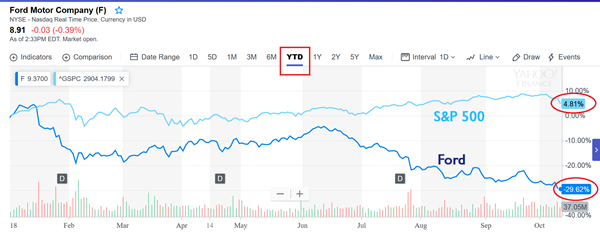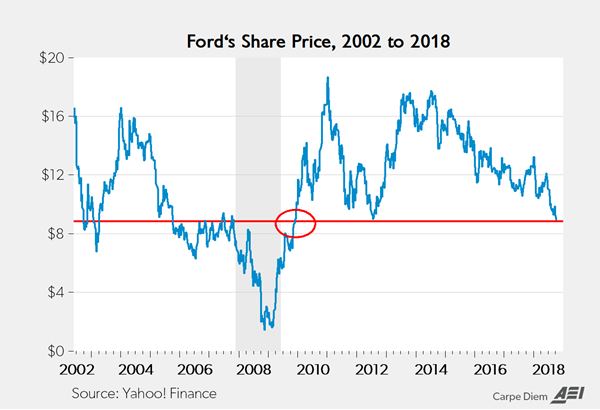Ford is the latest American business casualty in Trump’s trade war as the automaker experiences significant collateral damage and deadly friendly fire from Trump’s trade tariffs. From Fortune:
Ford is having a bad year in 2018. Its stock is down 29% (see top chart above vs. +4.8% for the overall market year-to-date and bottom chart showing Ford’s stock price now at an 8-year low, the lowest level since the fall of 2009), and the tariffs imposed by President Trump have reportedly cost the company $1 billion, as the company is in the midst of a reorganization. Now, the company is announcing layoffs.
Jim Hackett, Ford’s CEO, is working to engineer a $25.5 billion restructuring of the automaker, hoping to cut costs and remain competitive. But auto sales are down, and one reason is the trade tariffs that Trump has imposed on metals and other goods. Hackett has said they have already cost the company $1 billion in profit and could do “more damage” if the disputes aren’t resolved quickly.
Ford, the No. 2 US automaker by sales, is making aggressive job cuts as part of that reorganization, NBC News reported. While the company hasn’t said how many jobs will be lost, a report from Morgan Stanley estimates “a global headcount reduction of approximately 12%,” or 24,000 of Ford’s 202,000 workers worldwide.”
MP: I think it’s safe to say that Ford Motor Company and its shareholders and workers are, and will be in the future, getting pretty sick of this type of Trump’s “winning.”
Related: A New York Times article, “Trump Claims Trade Victories but Businesses Struggle Under His Approach,” provides many more examples of how Trump’s “winning” is putting US businesses, farmers, and workers at great risk of collateral damage from the Trump trade war.
This article was reprinted with permission from the American Enterprise Institute.
Mark J. Perry
Mark J. Perry is a scholar at the American Enterprise Institute and a professor of economics and finance at the University of Michigan’s Flint campus.
This article was originally published on FEE.org. Read the original article.
![]()


